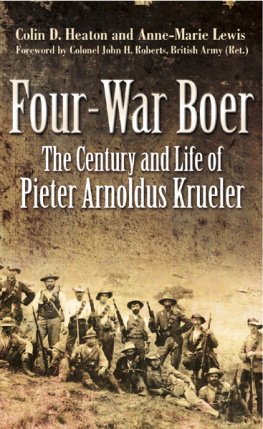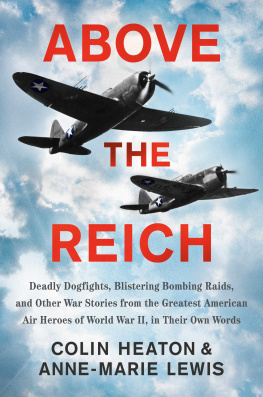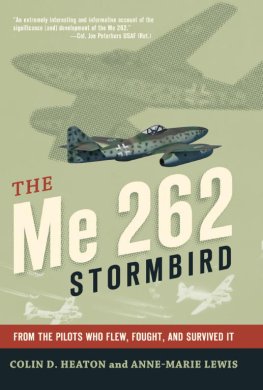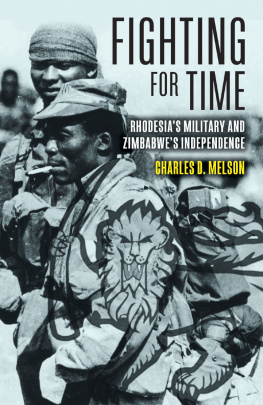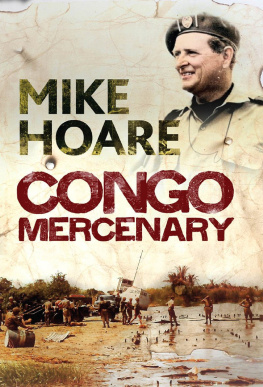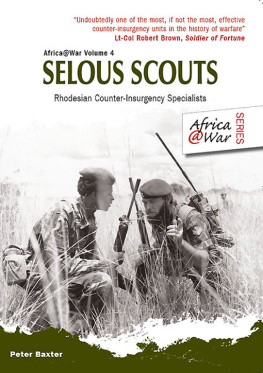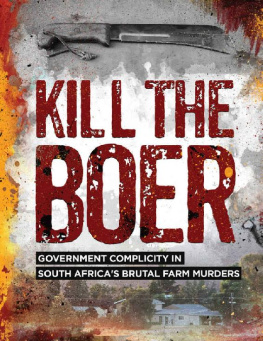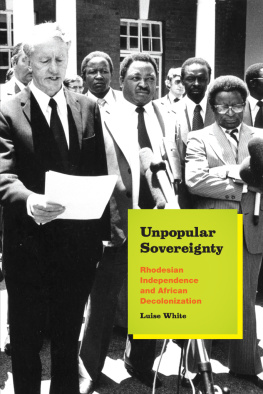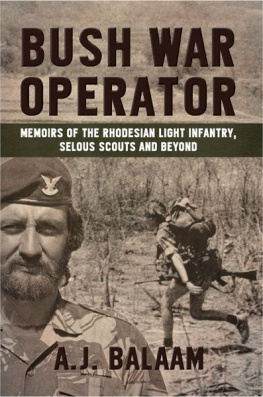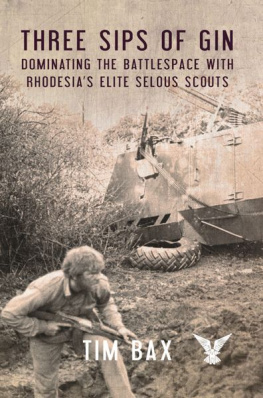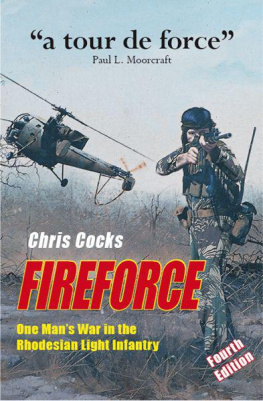Published in the United States of America and Great Britain in 2014 by
CASEMATE PUBLISHERS
908 Darby Road, Havertown, PA 19083
and
10 Hythe Bridge Street, Oxford, OX1 2EW
Copyright 2014 Colin D. Heaton and Anne-Marie Lewis
ISBN 978-1-61200-175-3
Digital Edition: ISBN 978-1-61200-176-0
Cataloging-in-publication data is available from the Library of Congress and
the British Library.
All rights reserved. No part of this book may be reproduced or transmitted in
any form or by any means, electronic or mechanical including photocopying,
recording or by any information storage and retrieval system, without permission
from the Publisher in writing.
10 9 8 7 6 5 4 3 2 1
Printed and bound in the United States of America.
For a complete list of Casemate titles please contact:
CASEMATE PUBLISHERS (US)
Telephone (610) 853-9131, Fax (610) 853-9146
E-mail:
CASEMATE PUBLISHERS (UK)
Telephone (01865) 241249, Fax (01865) 794449
E-mail:
CONTENTS |
: Colonel John H. Roberts, British Army |
ACKNOWLEDGMENTS
T he following persons contributed to this work over the years. Without their contributions, both directly and indirectly this book could have not been written: Pieter Krueler, Norman Melton, Jon Guttman, Neil Kaplan, the late Dr. Russell Frank Weigley, and my coauthor Anne-Marie Lewis. Special gratitude is extended to Diane Hurdley and Osprey Publishing for their graciously allowing us to reprint material. We also wish to thank our agent, Dr. Gayle Wurst of Princeton International Agency for the Arts for all of her efforts on our behalf.
I also wish to extend a special thanks and congratulations to one of my former students, Robert Daniels, who completed his Masters Degree at American Military University. His research paper on Spion Kop from the British perspective is a major component in and I look forward to working with him soon on a book specifically devoted to that battle.
I am especially grateful for the support and friendship over the years of Dr. Larry Usilton at the University of North Carolina at Wilmington. Also, I need to thank the late Dr. Andrew Clark, professor of African History at the University of North Carolina at Wilmington, who introduced me to African history as an undergraduate. I have not forgotten what he taught me.
Special thanks go to Prof. Steven Greer (Command Sergeant Major, U.S. Army Ret.) and Dr. Fred Stielow for taking the time to review this project, both being stellar members of the faculty of American Military University. I also want to thank Jon Guttman and Cy Stapleton of House of Gutenberg for their editorial expertise. Having extra eyes never hurts. We could not have finished this book without all of these wonderful people. Special thanks also to former Selous Scout David Scott Donelan of Mantrack for his contribution and advice regarding Rhodesian Special Forces. Thanks to Dr. Bryan Mark Rigg, my old friend and colleague: This book has finally come to light!
I also wish to thank my old classmate at the University of Strathcyde, Mark Reid for his assistance in placing me in contact with Col. John H. Roberts, who graciously contributed the foreword, a critical addition from an experienced British officer, and whose contributions were most welcomed.
Certain proceeds from the sale of this book and others will be donated to the Wounded Warriors Project as veterans are our greatest national treasures. We should never forget that.
FOREWORD
I n this remarkable book, Pieter Krueler recalls his extraordinary life in conversations with author Colin Heaton. These memories cover his childhood through unconventional military operations in the Boer War and the First World War in East Africa; with the rebels, Germans and Basques in the Spanish Civil War; World War II military training of South African troops; battles in the Congo; selection and training of Rhodesias Selous Scouts; and later advising on South African special forces training. His life of high adventure is a bridge over the rivers of time and warfare in the twentieth century that the author has skillfully placed into a coherent historical framework.
By the time he was seventeen Krueler had experienced the full horrors of the total war and its aftermath inflicted on the Boers, their families, and farms by the British. These boyhood Boer War experiencesfrom scouting, dispatch riding, patrolling, close-quarter fighting, through deliberate guerrilla operations in tactical victory and defeat, to incarceration and escape, and the tragic loss of his parentsshaped the man he was to become. Little wonder he opted for the quiet life at some points later.
His recollections constantly emphasize such individual military skills as field craft, marksmanship, explosives handling and demolition, first aid and field hygiene, navigation, observation, tracking, languages, and mountain, desert and jungle warfare and survival expertise. Personal qualities are identified as well, his own as well as of those of the men and soldiers he first selects and then trains and leads. Without confidence, self-reliance, ingenuity, extreme mental and physical stamina, and optimism, he, and they, would fail. A prickly pear in a conventional military sense, Kruelers leadership and initiative are simply outstanding; his mantra is that clear objectives and orders, detailed contingency planning, and rehearsals are essential for a missions success.
In todays fight in Afghanistan, men and women from supporting arms and services are often engaged in combat missions that in previous wars might well have been the province of specially trained infantry or other specialists, even special operations forces; their personal qualities and individual military skills are thus paramount. Reminding us of this, Kruelers demonstrated qualities, skills, principles, and vividly expressed experiences are as relevant to the soldiers of today and tomorrow as to their trainers and leaders.
John H. Roberts
Colonel, British Army (Retired)
Herefordshire, England
16th February 2011
Supplemental Commentary from
Warriors, Authors, and Historians
Heres a chance for an inside look at some of the most controversial periods of world military history from a unique perspective. Its not often readers get a chance to mine first-hand observations from a warrior who fought in the Boer War as well as the Spanish Civil War. The insights are fascinating and the authors back them with solid period context. This is no dry recitation of historical facts. Its a powerful recounting of pivotal world events from an African perspective. The detail recounted in chapters on Rhodesia and the famed Selous Scouts is encompassing and intriguing.
Captain Dale Dye, United States Marine Corps (Ret.), Warriors, Inc.
Pieter Krueler was a warrior I have to admire. Whether he was fighting as an insurgent, or against insurgents, his perseverance, adaptability and ingenuity as one of the fathers of special operations is seen here in its genesis. I know of no one else who can match his unique and collective experience, such as the longest infantry reconnaissance patrol in history, over 1,300 miles. I would have readily followed him into battle, and dreaded the prospect of fighting against him. His ability to learn from his enemies, educate his allies, live off the land, adjust to the ever changing combat condition, and survive the harshest variable environments and battles Africa had to offer hallmark this man, and the proud legacy of those select few, the cream of the elite who would later become the Selous Scouts. This book is a must read for anyone who wears a uniform, leads men into battle, or plans on fighting against those who do not conform to conventional warfare methods. Outstanding!
Next page
